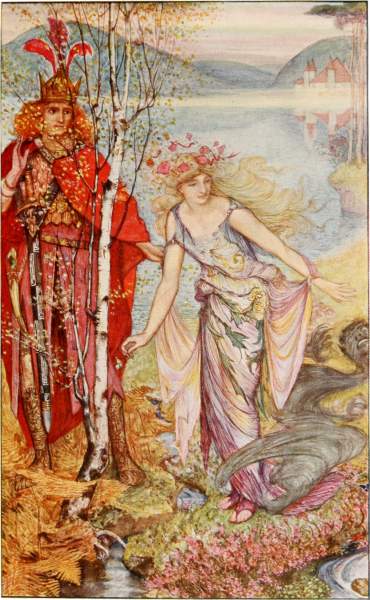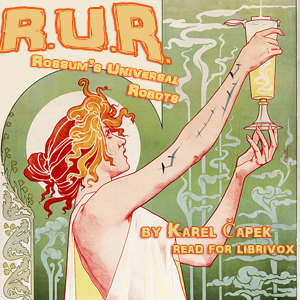
A regular exploration of public domain genre works available through Project Gutenberg, Internet Archive, and Librivox.
By Colleen McMahon: Andrew Lang (1844-1912) showed up on the birthday list for March 31, reminding me that I wanted to write about him here. Lang was a Scottish author and professor and had an astonishingly voluminous and broad output of work over his career. His academic areas of interest were in folklore and classics, but his writings ranged far beyond those, and aimed for different audiences, from fellow academics, to the general public, to children. Many of his works are completely outside or only tangential to the fantasy and science fiction field, so I will focus on Lang’s books that are of most potential interest to us here.
He is probably best known for having his name on a series of fairy tale books for children that collected stories from all over the world and had different colors in their titles — The Red Fairy Book, The Grey Fairy Book, The Green Fairy Book, etc. for a total of 12 in all. Chances are good that you have seen an edition of one or more of these books on your own childhood bookshelves or those of a relative, and they are still frequently republished today.
In addition to appealing to childhood nostalgia, it’s good as readers to know about these books because they have been a wellspring of inspiration for other authors. Sir Arthur Conan Doyle and J.R.R. Tolkien both praised Lang’s books. They have been a youthful formative influence and a source of tales to retell or transform for many authors since, including Aimee Bender and Margaret Atwood.
I made two new-to-me discoveries as I began reading up on these books by Andrew Lang. First, there were a LOT more books in the series than the 12 best-known fairy tale books, and encompassed poetry, history and biography, and mythology as well. There were 25 books all together, published between 1889 through 1913 and were usually published to coincide with the Christmas gift-giving season. Wikipedia has a good run-down of the titles in the complete series.
Second, while Lang worked with his wife Leonora “Nora” Blanche Alleyne Lang (1851-1933) closely on the first book, The Blue Fairy Book, the other volumes were almost entirely the work of Nora Lang and several other uncredited female authors. Nora Lang and her other collaborators sourced, translated, and rewrote the tales to be appropriate for Victorian/Edwardian children. Most of the books in the series were published under Andrew Lang’s name alone, although he credits her in the introduction to one of the books as having done the majority of the writing, and later books in the series listed “Mrs. Lang” as the author.
Author, editor, and children’s literature critic Anita Silvey wrote of the Langs in her 1995 book, Children’s Books and Their Creators:
The irony of [Andrew] Lang’s life and work is that although he wrote for a profession — literary criticism; fiction; poems; books and articles on anthropology, mythology, history, and travel […] he is best recognized for the works he did not write.
There are over 150 works listed under Andrew Lang’s name on Project Gutenberg, including translations of Greek classics like the Iliad and the Odyssey, collaborations with other authors, and books by other authors where he wrote an introduction. PG also has four books attributed to Mrs. Lang. Librivox has 28 books by Andrew Lang so far (with one in progress) as well as numerous versions of short stories and poems in various compilations, and two books and several essays by Leonora Blanche Lang.
This brief overview doesn’t come close to doing justice to the output of Andrew Lang, Nora Lang, and their various collaborators, and as I continue to explore their works myself, I am sure I will be back with more suggestions in the future!
If you haven’t heard of the Langs before and are interested in exploring some of their work, Project Gutenberg’s The Fairy Books of Andrew Lang is a great place to start. It’s an index work compiled by PG volunteers that has a linked index to all of the tales included in the twelve “color” fairy books.
Two more interesting recent finds:
- “Mars is Heaven” by Ray Bradbury (1920-2012) was adapted for the radio show X Minus One in 1955 and is a fun listen. There are a lot of old-time radio shows on Internet Archive and I’ve begun exploring them a bit, so watch for more radio recommendations to come in the future.
- R.U.R. (Rossum’s Universal Robots) by Karel ?apek (1890-1938)has been in the public domain in the original Czech for years, but an English translation came out in 1923, so it has just turned up on Project Gutenberg in the last month. There is also a version of the play on Librivox that was created in 2014, so I’m not sure if this relies on the same translation (it says 1922).

Recent Librivox releases:
- City of Endless Night by Milo Hastings (1884-1957)
An example of early dystopian science fiction written shortly after World War I, “City of Endless Night” imagines a future with a very different ending to the Great War. Set in 2151 and in an underground Berlin, our protagonist is Lyman De Forrest, an American chemist who enters the city to discover the hidden truths of a forbidden metropolis. The subterranean world hosts a highly-regimented society of 300,000,000 sun-starved humans. As the first outsider to enter, he’s horrified by what he finds, but will he accomplish his mission and escape the living tomb?
- Coffee Break Collection 18 – Pirates by Various
This is the eighteenth Coffee Break Collection, in which Librivox readers select English language public domain works of about 15 minutes or less in duration — perfect to listen to during commutes, workouts or coffee breaks. The topic for this collection is pirates… a rich source of material. Fiction, non-fiction, poetry, prose, essays… the romance of a life on the ocean waves and the danger posed by the ‘bad boys (and girls)’; but sometimes the law catches up with them.
- Finnish Legends by R. Eivand (??-??)
One dark winter’s day in the north of Finland, Father Mikko seeks shelter in an isolated cabin till a storm abates. After dinner the family sit around the fire, and the daughter asks him to tell them “all the stories he had ever heard from the very beginning of the world all the way down”, and so the book begins. In the words of the author “If this little volume may in any degree awake some interest in the Finnish people its author will be amply satisfied, and its end will have been attained.”
Discover more from File 770
Subscribe to get the latest posts to your email.

Unfortunately there are not a ton of anthology style SF radio shows whose archives survive. It took me a couple of years to work my way through all of them.
Thanks again for this, Colleen!
I’m glad the topic came up, because it caused me to look again at Archive’s holdings. I knew of about 30 episodes of a CBC horror anthology called Nightfall from 1980–2, and when I went just now, I found several sets (I haven’t even found the original bunch that I first saw yet), with between 79 and 139 episodes in each. Even if they all duplicate one another and my existing set as closely as possible, that’s over a hundred episodes I don’t have. Here’s the search results page for CBC NIGHTFALL:
https://archive.org/search.php?query=cbc%20nightfall
Neat find, Kip! Old radio shows are an area I’m just beginning to explore a bit.
As a retired cop, I’m a fan of The Line-Up, which reminds me a lot of Dragnet with the sort of ho-hum workaday small talk between the cop characters as they go about their day. I also love the “gimmick” of it, which has one of the characters announcing the daily lineup in which each recent arrestee has to line up in some sort of viewing room and answer a few questions about themselves (this is way before Miranda!) while victims of crimes in the audience point out the ones they think are the guilty parties who attacked them. Then the episode’s investigation proceeds from there. It’s a hoot.
Not SFF, but fun.
A particularly rich vein of radio shows at Archive can be found by a search on BBC, and narrowing the results by limiting it to audio. Adaptations of Raymond Chandler’s novels, Sayers, Charteris, Christie, Shakespeare, Doyle, Wodehouse, Cadfael, and Tolkien abound, and the trove includes individual gems like Ivanhoe, The Wind in the Willows, Pride and Prejudice, I, Claudius (that’s one item with a comma in it), Catch-22, Three Men in a Boat (To Say Nothing of the Dog), The Jungle Book, The House at Pooh Corner, The Foundation Trilogy, Peter Pan, Don Quixote, Nicholas Nickleby, Methuselah’s Children, and Bill, the Galactic Hero.
There are also decades of Lux Radio Theatre (including a particularly fine Maltese Falcon with Edward G. Robinson as Sam Spade), reasonable quantities of Orson Welles shows (including some superb Shakespeare, THE MAN WHO WAS THURSDAY, and a seven-part LES MISERABLES), and many seasons of the radio Gunsmoke, one of the best programs on the air, as well as lighter fare like The Saint (with Vincent Price), Nero Wolfe, Philip Marlowe, and Yours Truly, Johnny Dollar.
Not to mention all the stuff I’m forgetting right now. I listen to these on road trips and on exercise machines at the gym.
Oh yeah, and the CBC Dracula, with an ageless Lorne Green as the Count.